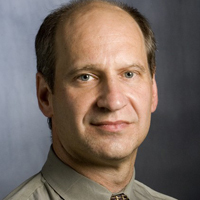Barry S. Myers, M.D., Ph.D., M.B.A., Professor of Biomedical Engineering, with appointments in Surgery, Business, and Anatomy and Director of the Center for Entrepreneurship and Research Commercialization

Dr. Myers has been a member of the Duke faculty since 1991. His research examines the biomechanics of head and neck injury with the goal of injury prevention. Dr. Myers founded and directs the Coulter Foundation Translational Partnership Program at Duke that provides $1 MM in early stage funding and management to faculty health care innovations annually with a goal of licensing and creating new life science start-up companies. Dr. Myers is the Director of Emerging Programs in the Duke Translational Research Institute where he is responsible for the consult service that provides funding and project management support to faculty translational research projects in the Duke Medical Center. Within the Office of Licensing and Ventures, he manages IT, legal and works with faculty to facilitate transfer of their innovations into the marketplace. He also maintains an active consulting practice including the NFL and NASCAR while serving as an Executive-in-Residence at Pappas Ventures advising several start-up companies.
Dr. Myers is considered by many as the preeminent researcher in his field worldwide, having over 100 manuscripts and publications on the subject. Among Dr. Myers many honors are the Stapp Award of Recognition, and the Isbrandt Award for automotive safety from the Society of Automotive Engineers. He is the six-time winner of the Stapp Award for research in impact biomechanics, more than any other individual, and also the Bertil Aldman award for impact biomechanics research. Dr. Myers has worked with all major organizations concerned with safety in the United States including the National Highway Traffic Safety Administration, the Consumer Product Safety Commission and the National Operating Committee on Standards for Athletic Equipment. Because of his breadth of experience in injury prevention, Dr. Myers was appointed to the position of Senior Scientific Advisor to the National Center for Injury Prevention and Control for two years. He has also consulted with most major automobile manufactures and automotive racing organizations worldwide.
Dr. Myers is a Distinguished Professor at Duke University, having received the Bass Chair in recognition of his accomplishments in research and teaching. He is the faculty advisor to four student best graduate student paper competition winners at national meetings. He was responsible for the 2004 revision of the Pratt School of Engineering undergraduate curriculum. He has served as Director of Undergraduate Studies and Director of Graduate Studies for the Department of Biomedical Engineering. He has also served as Senior Associate Dean for Industrial Partnerships and the Director of the Center for Entrepreneurship and Research Commercialization in the Pratt School of Engineering.
| Office Location: | |
| Email Address: |  
|
| Web Page: |
- Education:
- MBA, Duke University, 2005
- PhD, Duke University, 1991
- MD, Duke University, 1991
- BASc, University of Toronto, 1985
- PhD, Duke University, 1991
- Research Interests:
Dr. Myers is an expert in head and neck impact injury biomechanics. He is also interested in translational research innovation overseeing programs to advance faculty research to market.
- Specialties:
-
Technology Transfer
Injury and Orthopedic Biomechanics
Entrepreneurship
- Awards, Honors, and Distinctions
Fellow, American Institute for Medical & Biological Engineering, 2003
Founders Award, Southern Consortium for Injury Biomechanics, 2006
- Recent Publications
(More Publications)
- A. T. Dibb and R. W. Nightingale and J. F. Luck and V. C. Chancey and L. E. Fronheiser and B. S. Myers, Tension and Combined Tension-Extension Structural Response and Tolerance Properties of the Human Male Ligamentous Cervical Spine, Journal Of Biomechanical Engineering-transactions Of The Asme, vol. 131 no. 8 (August, 2009) [abs].
- G. P. Siegmund and M. B. Davis and K. P. Quinn and E. Hines and B. S. Myers and S. Ejima and K. Ono and K. Kamiji and T. Yasuki and B. A. Winkelstein, Head-turned postures increase the risk of cervical facet capsule injury during whiplash, Spine, vol. 33 no. 15 (July, 2008), pp. 1643 -- 1649 [abs].
- J. D. Finan and R. W. Nightingale and B. S. Myers, The Influence of Reduced Friction on Head Injury Metrics in Helmeted Head Impacts, Traffic Injury Prevention, vol. 9 no. 5 (2008), pp. 483 -- 488 [abs].
- V. C. Chancey and D. Ottaviano and B. S. Myers and R. W. Nightingale, A kinematic and anthropometric study of the upper cervical spine and the occipital condyles, Journal Of Biomechanics, vol. 40 no. 9 (2007), pp. 1953 -- 1959 [abs].
- R. W. Nightingale and V. C. Chancey and D. Ottaviano and J. F. Luck and L. Tran and M. Prange and B. S. Myers, Flexion and extension structural properties and strengths for male cervical spine segments, Journal Of Biomechanics, vol. 40 no. 3 (2007), pp. 535 -- 542 [abs].